- Home
- Clive Barker
Galilee Page 12
Galilee Read online
Page 12
So they dutifully stayed in the store, and the snow, as predicted, got worse. There was a smattering of business, but nothing substantial.
And then, just as Erickson was starting to take the displays out of the window for the night, a man came in with an envelope for Rachel.
“Mr. Geary says he’s sorry, he didn’t get your name,” the messenger told her.
“My name’s Rachel.”
“I’ll tell him. I’m his driver and his bodyguard, by the way. I’m Ralph.”
“Hello, Ralph.”
Ralph—who was six-foot-six if he was an inch, and looked as though he’d had a distinguished career as a punching bag—grinned. “Hello, Rachel,” he said. “I’m pleased to meet you.” He pulled off his leather glove and shook Rachel’s hand. “Well, good-night folks.” He trudged back to the door. “Avoid the Tobin Bridge, by the way. There was a wreck and it’s all snarled up.”
Rachel had no wish to open the envelope in front of Noelle or Erickson, but nor could she stand the idea of waiting another nineteen minutes until the store was closed, and she was out on the street alone. So she opened it. Inside was a short, scrawled note from Mitchell Geary, inviting her to the Algonquin Club for drinks the following evening, which was Christmas Eve.
Three and a half weeks later, in a restaurant in New York, he gave her the diamond butterfly brooch, and told her he was falling in love.
II
This is as good a place as any to attempt a brief sketch of the Geary family. It’s a long, long drop from the topmost branch, where Rachel Pallenberg was poised the moment she became the wife of Mitchell Geary, to the roots of the family; and those roots are buried so deep into the earth I’m not sure I’m quite ready to disinter them. So instead allow me to concern myself—at least for now—with that part of the family tree that’s readily visible: the part that appears in the books about the rise and influence of the Geary engine.
It quickly becomes apparent, even in a casual skimming of these volumes, that for several generations the Gearys have behaved (and have been treated) like a form of American royalty. Like royalty, they’ve always acted as though they were above the common law; this in both their private and their corporate dealings. Over the years several members of the dynasty have behaved in ways that would have guaranteed incarceration if they hadn’t been who they were: everything from driving in a highly intoxicated state to wife-beating. Like royalty, there has often been a grandeur to both their passions and to their failures which galvanized the rest of us, whose lives are by necessity confined. Even the people that they’d abused over the years—either in their personal lives or in their corporate machinations—were entranced by them; ready to forgive and forget if the gaze of the Gearys would only be turned their way again.
And, like royalty, they had their feet in blood. No throne was ever won or held without violence; and though the Gearys were not blessed by the same king-making gods who’d crowned the royal heads of Europe, or the emperors of China or Japan, there was a dark, bloody spirit in their collective soul, a Geary demon if you will, who invested them with an authority out of all proportion to their secular rights. It made them fierce in love, and fierce still in hatred, it made them iron-willed and long-lived; it made them casually cruel and just as casually charismatic.
Most of the time, it was as though they didn’t even know what they were doing, good, bad or indifferent. They lived in a kind of trance of self-absorption, as though the rest of the world was simply a mirror held up to their faces, and they passed through life seeing only themselves.
In some ways love was the ultimate manifestation of the Geary demon; because love was the way that the family increased itself, enriched itself.
For the males it was almost a point of pride that they be adulterous, and that the world know it, even if the subject wasn’t talked about above a whisper. This dubious tradition had been initiated by Mitch’s great-grandfather, Laurence Grainger Geary, who’d been a cocksman of legendary stamina, and had fathered, according to one estimate, at least two dozen bastards. His taste in mistresses had been broad. Upon his death two black women in Kentucky, sisters no less, claimed to have his children; a very well-respected Jewish philanthropist in upstate New York who had served with old man Geary on a committee for the Rehabilitation of Public Morals, had attempted suicide, and revealed in her farewell letter the true paternity of her three daughters, while the madam of a bordello in New Mexico had showed her son to the local press, pointing out how very like a Geary child he looked.
Laurence’s wife Verna had made no public response to these claims. But they took their toll on the unhappy woman. A year later she was committed to the same institution that had housed Mary Lincoln in her last years. There Verna Geary survived for a little over a decade, before making a pitiful exit from the world.
Only one of her four children (she’d lost another three in their infancy) was at all attentive to her in her failing years: her eldest daughter, Eleanor. The old woman did not care for Eleanor’s constant kindness, however. She loved only one of her children enough to beg his presence, in letter after letter, through the period of her incarceration: that was her beloved son Cadmus. The object of her affections was unresponsive. He visited her once, and never came again. Arguably Verna was the author of her own son’s cruelty. She’d taught him from his earliest childhood that he was an exceptional soul, and one of the manifestations of this specialness was the fact that he never had to set eyes on any sight that didn’t please him. So now, when he was faced with such a sight—his mother in a state of mental disarray—he simply averted his eyes.
“I want to surround myself with things that I enjoy looking at,” he told his appalled sister, “and I do not enjoy looking at her.”
What was pleasing the twenty-eight-year-old Cadmus’ senses at that time was a woman called Katherine Faye Browning—Kitty to those close to her—the daughter of a steel magnate from Pittsburgh. Cadmus had met her in 1919 and courted her fiercely for two years, during which time he had begun to work his financial genius on his father’s already considerable wealth. This was no chance collision of circumstances. The more Kitty Browning toyed with his feelings (refusing to see him for almost two months in the autumn of that year simply because—as she wrote—“I wish to see if I can live without you. If I can, I will, because that means you’re not the man who rules my heart”) the more frustrated love fueled young Cadmus’s ambition. His reputation as a financial strategist of genius—and a demonic enemy if crossed—was forged in those years. Though he would later mellow somewhat, when people thought of Cadmus Northrop Geary it was the young Cadmus they brought to mind: the man who forgave nothing.
In the process of building his empire he acted like a secular divinity. Communities dependent upon industries he purchased were destroyed at his whim, while others flourished when he looked upon them favorably. By his early middle age he had achieved more than most men dream of in a hundred lifetimes. There was no place of power in which he was not known and lionized. He influenced the passing of bills and the election of judges; he bought Democrats and Republicans alike (and left them at the mercy of their parties when he was done with them); he made great men look foolish, and—when it suited him, as it occasionally did—elevated fools to high office.
Need I tell you that Kitty Browning finally succumbed to his importunings and married him? Or add that he committed his first act of adultery—or philandering, as he preferred—while they were on their honeymoon?
A man of Cadmus’s power and influence—not to mention looks (he was built after the classic American model, his body graceful in action and easy in repose, his long, symmetrical features perpetually tanned, his eyes sharp, his smile sharper still)—a man such as this is always surrounded by admirers. There was nothing languid or dull about him; nothing that bespoke doubt or fatigue: that was the heart of his power. Had he been a better man, his sister once remarked, or a much worse one, he might have been president. But he had no inter
est in wasting his attributes on politics. Not when there were so many women to seduce (if seduction was the word for something so effortless). He divided his time between his offices in New York and Chicago, his houses in Virginia and Massachusetts, and the beds of some several hundred women a year, paying off irate husbands when they found out, or employing them.
As for Kitty, she had a life of her own to lead: four children to raise, and a social calendar of her own which was nicely filled. The last thing she wanted was a husband under her feet. As long as Cadmus didn’t embarrass her with his shenanigans, she was perfectly content to let him go his way.
There was only one romance—or more correctly a failed romance—that threatened this strange equilibrium. In 1926, at the invitation of Lionel Bloombury, who was then the head of a small independent studio in Hollywood, Cadmus went west. He considered himself quite the connoisseur when it came to movies, and Lionel had suggested he could do worse than invest some of his capital in the business. Indeed he would later do so; he put Geary money into Metro-Goldwyn-Mayer, and saw, during its golden years, a substantial return on his investment; he also purchased sizable parcels of land in what would later become Beverly Hills and Culver City. But the only deal he really wanted in Hollywood he failed to make, and that was with an actress called Louise Brooks. He met her first at the premiere of Beggars of Life, a Paramount picture she’d made, starring opposite Wallace Beery. She’d seemed to Cadmus an almost supernatural presence; for the first time, he’d said to a friend, he believed in the idea of Eden; of a perfect garden from which men might be exiled because of the manipulations of a woman.
The subject of this metaphysical talk, Louise herself, was without question a great beauty: her dark sleek hair cut almost boyishly to frame a pale, exquisitely sculptured face. But she was also an ambitious and intellectually astute woman, who wasn’t interested in being an objet d’art for Cadmus or anybody else. She left for Germany the next year, to star in two pictures there, one of which, Die Büchse de Pandora, would immortalize her. Cadmus was by now so enraptured that he sailed to Europe in the hope of a liaison, and it seems she was not entirely scornful of his advances. They dined together; and took day trips when her filming schedule allowed. But it seems she was dallying withz him. When she went back to filming she complained to her director, a man called Pabst, that the presence of Geary on set was spoiling her concentration and could he please be removed? There was some kind of minor fracas later that week, when Cadmus—who had apparently attempted to purchase the studio that was making Die Büchse de Pandora in the interim, and failed—forced his way onto the set in the hope of talking to her. She refused to speak to him and he was forcibly removed. Three days later he was on a ship headed back to America.
His “folly,” as he would later call this episode, was over. He returned to his business life with a sharpened—even rapacious—appetite. A year after his return, in October of 1929, came the stock market crash which marked the beginning of the Great Depression. Cadmus rode the calamity like a broncobuster from one of his beloved Westerns; he was unshakable. Other men of money went into debt and penury or ended up dead by their own hand, but for the next few years, while the country suffered through the worst economic crisis since the Civil War, Cadmus turned the defeats of those around him into personal victories. He bought the ruins of other men’s enterprises for a pittance; putting out lifeboats for a lucky few who were drowning around him, thus assuring himself of their fealty once the storm was over.
Nor did he limit his business dealings to those who’d been relatively honest but had fallen on hard times; he also dealt with men who had blood on their hands. These were the last days of Prohibition; there was money to be made from supplying liquor to the parched palates of America. And where there was profit, there was Cadmus Geary. In the four years between his return from Germany and the repeal of the Eighteenth Amendment, he funneled Geary family funds into several illicit booze and “entertainment” businesses, raking off monies that no taxman ever saw, and ploughing it back into his legitimate concerns.
He was careful with his choice of business partners, avoiding the company of individuals who took too much pleasure in their own notoriety. He never did business with Capone or his like, preferring the quieter types, like Tyler Burgess and Clarence Filby, whose names didn’t make it into the headlines or the history books. But in truth he didn’t have the stomach for criminality. Though he was reaping enormous sums of money from these illicit dealings, in the spring of 1933, just before the repeal was passed by Congress, he broke all contact with ‘The Men in the Midwest,” as he called them.
In fact it was Kitty who forced his hand. Normally she kept herself out of financial affairs, but this, she told him, was not a fiscal matter: the reputation of the family would be irreparably harmed if any association with this scum could be proved. He readily bowed to her pressure; he didn’t enjoy doing business with these people anyway. They were peasants, most of them; a generation ago, he’d said, they’d have been in some Godforsaken corner of Europe eating scabs off their donkeys. The remark had amused Kitty, and she took it for her own, using it whenever she was feeling particularly vicious.
So Prohibition and the grim years of the Great Depression passed, and the Gearys were now one of the richest families in the history of the continent. They owned steel mills and shipyards and slaughterhouses. They owned coffee plantations and cotton plantations and great swaths of land given over to barley and wheat and cattle. They owned sizable portions of real estate in the thirty largest cities in America, and were the landlords of many of the towers and fancy houses and condominiums that were built on that land. They owned racehorses, racetracks, and racing cars. They owned shoe manufacturers and fish canneries and a hot dog franchise. They owned magazines and newspapers, and distributors who delivered those magazines and newspapers, and the stands from which those magazines and newspapers were sold. And what they could not own, they put their name on. As though to distinguish his noble family from the peasants with whom he had ceased to do business in ’33, Cadmus allowed Kitty to use tens of millions of Geary dollars in philanthropic endeavors, so that in the next two decades the family name went up on the wings of hospitals, on schools, on orphanages. All these good works did not divert the eyes of cynical observers from the sheer scale of Cadmus’s acquisitiveness, of course. He showed no sign of slowing up as he advanced in years. In his middle sixties, at an age when less driven men were planning fishing trips and gardens, he turned his appetites eastward, toward Hong Kong and Singapore, where he repeated the pattern of plunder that had proved so successful in America. The golden touch had not deserted him: company after company was transformed by Cadmus’s magic. He was a quiet juggernaut, unseen now for the most part, his reputation almost legendary.
He continued his philandering, as he had in his younger days, but the hectic business of sexual conquest was of far less significance to him now. He was still, by all accounts, a remarkably adept bed partner (perhaps consciously he chose in these years women who were less discreet than earlier conquests; advertisements for his virility, in fact); but after the Louise Brooks episode he never came so close to the blissful condition of love as when he was in full capitalist flight. Only then did he feel alive the way he had when he’d first met Kitty, or when he’d followed Louise to Germany; only then did he exalt, or even come close to exaltation.
Meanwhile, of course, another generation of Gearys was growing up. First there was Richard Emerson Geary, born in 1934, after Kitty had suffered two miscarriages. Then, a year later, Norah Faye Geary, and two years after that George, the father of Mitchell and Garrison.
In many ways Richard, Norah, and George were the most emotionally successful of any of the generations. Kitty was sensible to the corruptions of wealth: she’d seen its capacity to destroy healthy souls at work in her own family. She did her level best to protect her children from the effects of being brought up feeling too extraordinary; and her capacity for love, stymied i
n her marriage, flowered eloquently in her dealings with her children. Of the three it was Norah who was most indulged; and Cadmus was the unrepentant indulger. She rapidly became a brat, and nothing Kitty could do to discipline her did the trick. Whenever she didn’t get what she wanted, she went wailing to Daddy, who gave her exactly what she requested. The pattern reached grotesque proportions when Cadmus arranged for the eleven-year-old Norah—who had become fixated upon the notion of being an actress—to star in her own little screen test, shot on the backlot at MGM. The long-term effects of this idolatry would not become apparent for several years, but they would bring tragedy.
In the meantime, Kitty dispersed her eminently practical love to Richard and George, and watched them grow into two extraordinarily capable men. It was no accident that neither wanted much to do with running the Geary empire; Kitty had subtly inculcated into them both a distrust of the world in which Cadmus had made a thousand fortunes. It wasn’t until the first signs of Cadmus’s mental deterioration began to show, in his middle seventies, that George, the youngest, agreed to leave his investment company and oversee the rationalization of what had become an unwieldy empire. Once in place, he found the task more suited his temperament than he’d anticipated. He was welcomed by the investors, the unions, and the board members alike as a new kind of Geary, more concerned with the welfare of his employees, and the communities which were often dependent upon Geary investment, than with the turning of profit.
He was also a successful family man, in a rather old-fashioned way. He married one Deborah Halford, his high school sweetheart, and they lived a life that drew inspiration from the kind of solid, loving environment which Kitty had tried so hard to provide. His older brother Richard had become a trial lawyer with a flair for murderers and rhetoric; his life seemed to be one long last act from an opera filled with emotional excess. As for poor Norah, she’d gone from one bad marriage to another, always looking for, but never finding, the man who would give her the unconditional devotion she’d had from Daddy.

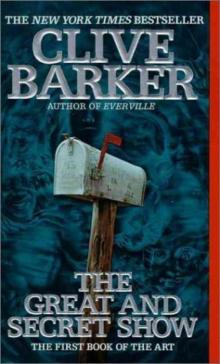 The Great and Secret Show
The Great and Secret Show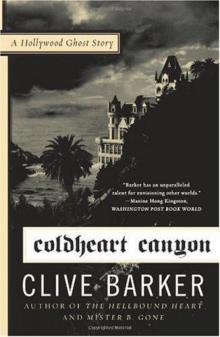 Coldheart Canyon: A Hollywood Ghost Story
Coldheart Canyon: A Hollywood Ghost Story Galilee
Galilee Cabal
Cabal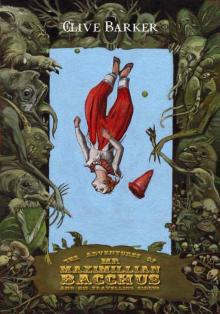 The Adventures of Mr. Maximillian Bacchus and His Travelling Circus
The Adventures of Mr. Maximillian Bacchus and His Travelling Circus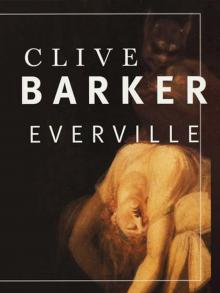 Everville
Everville Books of Blood: Volume Three
Books of Blood: Volume Three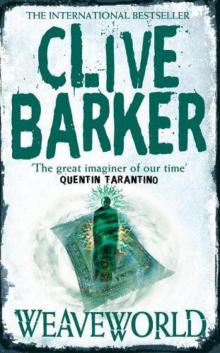 Weaveworld
Weaveworld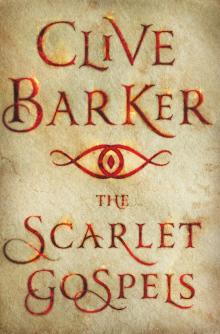 The Scarlet Gospels
The Scarlet Gospels Sacrament
Sacrament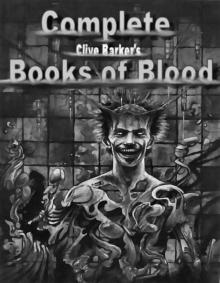 Books of Blood: Volumes 1-6
Books of Blood: Volumes 1-6 Sherlock Holmes and the Servants of Hell
Sherlock Holmes and the Servants of Hell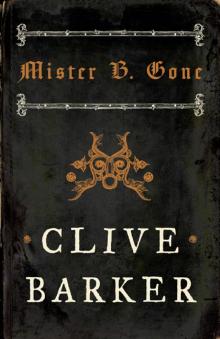 Mister B. Gone
Mister B. Gone Imajica
Imajica The Reconciliation
The Reconciliation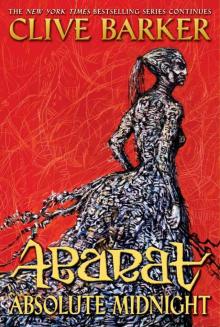 Abarat
Abarat Clive Barker's First Tales
Clive Barker's First Tales The Hellbound Heart
The Hellbound Heart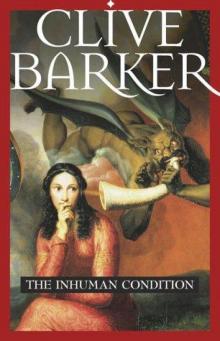 The Inhuman Condition
The Inhuman Condition Infernal Parade
Infernal Parade Days of Magic, Nights of War
Days of Magic, Nights of War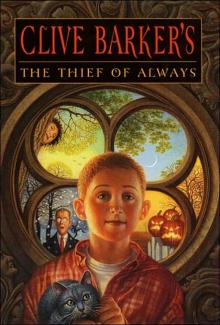 The Thief of Always
The Thief of Always Books of Blood Vol 2
Books of Blood Vol 2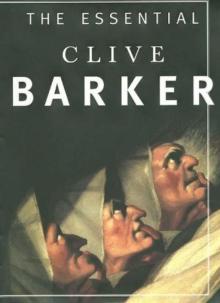 The Essential Clive Barker
The Essential Clive Barker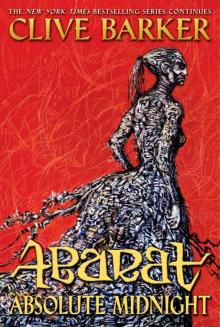 Abarat: Absolute Midnight a-3
Abarat: Absolute Midnight a-3 The Damnation Game
The Damnation Game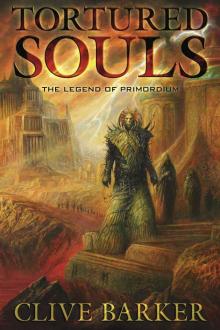 Tortured Souls: The Legend of Primordium
Tortured Souls: The Legend of Primordium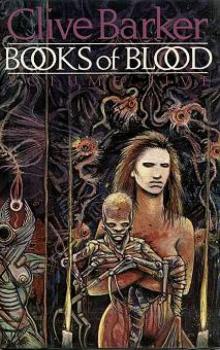 Books of Blood Vol 5
Books of Blood Vol 5 Imajica 02 - The Reconciliator
Imajica 02 - The Reconciliator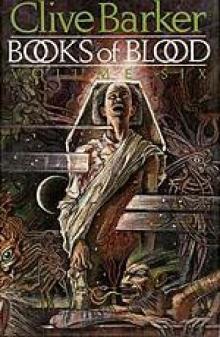 Books Of Blood Vol 6
Books Of Blood Vol 6 Imajica 01 - The Fifth Dominion
Imajica 01 - The Fifth Dominion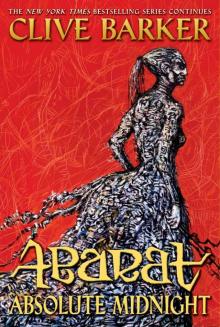 Abarat: Absolute Midnight
Abarat: Absolute Midnight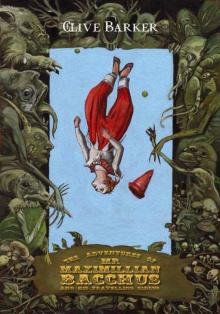 The Adventures of Mr. Maximillian Bacchus & His Traveling Circus
The Adventures of Mr. Maximillian Bacchus & His Traveling Circus Tonight, Again
Tonight, Again Abarat: The First Book of Hours a-1
Abarat: The First Book of Hours a-1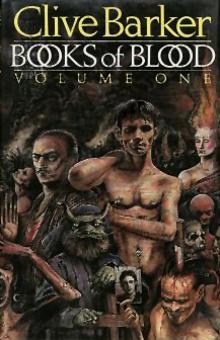 Books Of Blood Vol 1
Books Of Blood Vol 1 Age of Desire
Age of Desire Imajica: Annotated Edition
Imajica: Annotated Edition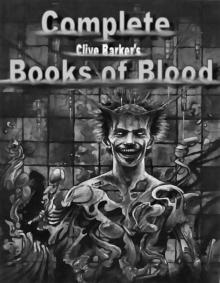 Complete Books of Blood
Complete Books of Blood Gutted: Beautiful Horror Stories
Gutted: Beautiful Horror Stories Shivers 7
Shivers 7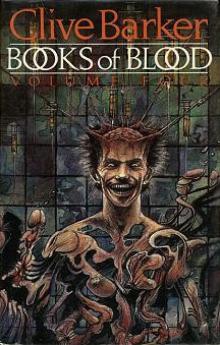 Books Of Blood Vol 4
Books Of Blood Vol 4